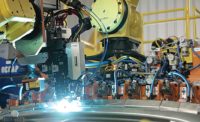Because batteries are bulky and heavy, lightweighting is one of the biggest challenges facing the automotive industry today. Engineers at LS Cable & Systems Ltd. (LS C&S), a leading supplier based in South Korea, believe aluminum wiring is the answer.
The company recently developed a new high-strength aluminum material that has been assigned alloy number AA8031 by the Aluminum Association. It boasts an enhanced strength of over 40 percent compared to traditional aluminum materials, which have been criticized for their weakness, and improved malleability. Another disadvantage of aluminum—where conductivity drops when strength is enhanced—has also been improved.
LS C&S projects that aluminum will replace copper in industries where lighter weight is important, such as the automotive manufacturing. It claims that changing the conductor in vehicle wiring from copper to aluminum reduces wire weight by more than 40 percent.
“AA8031 has been commercialized for wires in vehicles manufactured by Hyundai and Kia since 2019 and its quality has been proven,” claims Sang-gyeom Kim, an engineer at the LS C&S Base Technology Research Center.
LS C&S plans to expand its supply of aluminum materials for electric cars and wind power generators through its high-strength aluminum material specialist company LS Alsco. It also recently stopped producing round wire to focus on flat, rectangular wire to address growth in the EV market that has boosted demand for high-voltage, high-output and large-capacity electric motors. The company is the exclusive supplier of flat wire for Hyundai Motor Co.’s Ioniq 5 and Kia Corp.’s EV6 vehicles.


